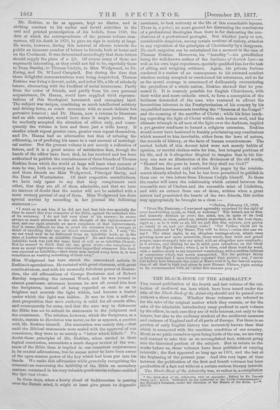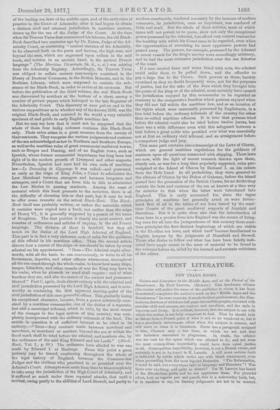THE BLACK-BOOK OF THE ADMIRALTY.*
Tens recent publication of the fourth and last volume of the col- lection of mediaeval sea laws which have been issued under the title of the Black-Book of the Admiralty should not be passed over without a short notice. Whether these volumes are referred to for the sake of the original matter which they contain, or for the sake of the admirable introductory essay prefixed to each volume by the editor, in each case they are of wide interest, not only to the lawyer, but also to the ordinary student of the mediaeval manners and customs of England and of all parts of Europe. For there is no portion of early English history less accurately known than that which is connected with the maritime condition of our country. Much as we pride ourselves upon being lords of the sea, we are very well content to take this as an accomplished fact, without going into the historical portion of the subject. But to return to the works before us, these volumes have been published at varying intervals ; the first appeared so long ago as 1871, and the last at the beginning of the present year. And this very lapse of time between the publication of the first and fourth volumes has been productive of a fact not without a certain curious literary interest. The Black-Book of the Admiralty was, or rather is, a compilation • The Rack-Book of the Admiralty, with an Appendix. Bitted by Sir Travers Twles, Q.0., AXIL. Published by the Authority of the Lords Commissioners r her Majesty's Treasury, under the direction of the Master of the Rolls. 4 ,-'s• 1871-76. of the leading sea laws of the middle-ages, and of the early rules of practice in the Court of Admiralty, after it had begun to obtain a distinct civil and criminal jurisdiction in maritime matters, drawn up for the use of the Judge of the Court. At the time when Sir Travers Twiss first commenced his labours, the old Black- Book described two centuries ago by Dr, Exton, Judge of the Ad- miralty Court, as containing " ancient statutes of the Admiralty, to be observed both on the ports and havens, the high seas, and beyond the seas, which are engrossed upon vellum in the said book, and written in an ancient hand, in the ancient French language " (The Maritime Dicteologie, bk. ii., c. xi.) was missing from the Admiralty Registry. Accordingly, Sir Travers Twiss was obliged to collate various manuscripts contained in the library of Doctors' Commons, in the British Museum, and in the Bodleian Library, which were supposed to contain the sub- stance of the Black-Book, in order to arrive at its contents. But before the publication of the third volume, the real Black-Book was discovered by accident at the bottom of a chest, among a number of private papers which belonged to the late Registrar of the Admiralty Court. This discovery at once put an end to the various suppositions as to whether any of the known MSS. was the original Black-Book, and restored to the world a very valuable specimen of and guide to early English maritime law.
But we may say here that it must not be supposed that the whole of these four bulky volumes contains this Black-Book only. Their value arises in a great measure from the variety of theircontents. They comprise the various judgments and customs of the sea acknowledged as law in Northern and Southern Europe, as well as the maritime rules of great commercial mediaeval towns, such as Bruges and Dantzig, and of an English town, such as Ipswich, whose former commercial importance has long been lost sight of in the modern growth of Liverpool and other seaports. Nevertheless, Ipswich had once had its own code of maritime law—Le Domesday de Gippewyz it was called—and possessed, as early as the reign of King John, a Court to administer the Law Merchant between strangers and between burgesses and strangers, and a Court that sat from tide to tido to administer the Law Marine to passing mariners. Among the mass of material which this book presents to the reviewer, there is all the difficulty of choosing this or that part, but it may be well to offer some remarks on the actual Black-Book. The Black- Book itself was probably written, or rather the materials which it contains were copied into a book, not earlier than the reign of Henry VI., it is generally supposed by a person of the name of Boughton. The first portion is clearly the most ancient, and consists of ordinancea and articles of inquiry, in the old French language. The division of these is fourfold, but they all touch on the duties of the Lord High Admiral of England. This part is in fact a very elaborate code of rules for the guidance of this official in his maritime office. Thus the second article directs how a census of the ships-of-war should be taken by every admiral on his appointment. " Item—The Admiral ought after- wards, with all the haste he can conveniently, to write to all his lieutenants, deputies, and other officers whatsoever, throughout all the sea-coast through the whole realm, to know how many ships, barges, bilanders, and other vessels-of-war the King may have in his realm, when he pleaseth or need shall require ; and of what burthen they are, and also the names of the owners and possessors thereof." Part C, again, deals almost entirely with the criminal and civil jurisdiction possessed by the Lord High Admiral, and is note- worthy as containing the first apparent starting-point of the civil jurisdiction of this once powerful officer. This gradually losing its exceptional character, became, from a power arbitrarily exer- cised by a maritime commander, one of the duties of a separate, but still a municipal tribunal, which in 1873, by the most recent of the changes in the legal system of this country, was com- pletely incorporated with the ordinary tribunals of the land. The article in question is of sufficient interest to be cited in its entirety,—" Item—Any contract made between merchant and merchant, or merchant or mariner, beyond the sea or within the flood-mark shall be tried before the admiral, and nowhere else, by the ordinance of the said King Edward and his Lords." (Black- Book, Vol. I., p. 69.) The ordinance here alluded to was one made by Edward I. at Hastings. From this point a great jealousy may be traced, continuing throughout the whole of the legal history of England, between the Common-law Judges and the civilians who practised in or presided over the Admiral's Court. Attempts were made from time to time completely to take away the jurisdiction of the High Court of Admiralty, and it suffered so much under these repeated attacks, that until it revived, owing partly to the abilities of Lord Stowell, and partly to
modern enactments, rendered necessary by the increase of modern commerce, its jurisdiction, once so important, was rendered or little real avail. But the whole of these articles, most of which space will not permit us to quote, show not only the exceptional power possessed by the Admiral, but afford very natural reasons for the hostility with which his Court came to be regarded, even when the opportunities of exercising its most oppressive powers had passed away, The powers, for example, possessed by the Admiral to arrest vessels for the king's service were exceedingly arbitrary, and he had the most extensive jurisdiction over the sea fisheries of the coast.
If a man erected dams and weirs fitted with nets, the admiral' could order them to be pulled down, and the offender to pay a large fine to the Crown. Such powers as these, harshly exercised as they no doubt frequently were, not for the purposes of justice, but for the sake of the fines which they brought into the purse of the king or of the admiral, must certainly have caused' the jurisdiction enjoyed by this commander to be regarded as contrary to the comparative freedom which persons enjoyed when they did not fall within the maritime law, and as an invasion of the rights which were universally possessed by Englishmen, in a free trial before the ordinary tribunals of the country for other than so-called maritime offences, It is true that persons tried before the admiral could also be tried before twelve jurors, but there was a wide difference even with this safeguard between a. trial before a great noble who presided over what was essentially not at first an ordinary civil tribunal, and an arraignment before a competent judge and jury.
This same part contains also a transcript of the Laws of Oleron, which are general maritime regulations for the guidance of mariners upon all questions connected with shipping. These laws are now, with the light of recent research thrown upon them, clearly not, as was for a long time popularly supposed, rules pro- mulgated at the Island of Oleron by Richard I. on his return. from the Holy Land. In all probability, they were granted to the citizens of Oleron by the Dukes of Guienno, before the island passed into the possession of the British Crown, for no doubt they contain the laws and customs of the sea as known at a time very far anterior to that when the latter were introduced into England. This is easily accounted for, since the vagina principles of maritime law generally acted on were fornau- lated first of all in the tables of sea laws issued by the mari- time Courts of the great mediaeval seaports of Amalphi and' Barcelona. But it is quite clear also that the introduction of these laws in a precise form into England was the means of bring- ing once for all into the jurisprudence of this country those maH- time principles the first distinct beginnings of which are visible in the Median sea laws, and which havrbecome familiarised to Euglish lawyers by the judgments of Mansfield and Stowell., Those who desire to follow out what has here been briefly indi- cated have ample means in the mass of material to be found in the volumes before us, aided by the learned and accurate criticisms of the editor.







































 Previous page
Previous page